-

1. Ushira:
Ushira, also known as Vetiver or Vetiveria zizanioides, offers several potential health benefits, particularly in traditional medicine systems like Ayurveda.
Here are some of the health benefits associated with ushira:
- Cooling Properties: Ushira is known for its cooling effect on the body, making it beneficial for conditions associated with excess heat or inflammation. It is often used to alleviate symptoms of fever, heatstroke, and inflammatory conditions.
- Digestive Health: In Ayurveda, ushira is believed to have digestive properties. It is used to improve digestion, treat indigestion, and relieve symptoms like bloating and gas.
- Stress Relief: The aroma of ushira has a calming and relaxing effect on the mind and body. It is used in aromatherapy to reduce stress, anxiety, and nervous tension.
- Anti-inflammatory: Ushira contains compounds that exhibit anti-inflammatory properties. It may help reduce inflammation in conditions such as arthritis, muscle pain, and skin inflammation.
- Antimicrobial Activity: Ushira has antimicrobial properties, which can help combat various bacterial and fungal infections. It is used topically to treat wounds, cuts, and skin infections.
- Menstrual Disorders: In traditional medicine systems, ushira is used to regulate menstrual cycles and alleviate symptoms of menstrual disorders like irregular periods, dysmenorrhea (painful menstruation), and menorrhagia (heavy menstrual bleeding).
- Detoxification: Ushira is considered to have detoxifying properties. It is used to cleanse the blood, liver, and kidneys, promoting overall detoxification and purification of the body.
- Respiratory Health: Ushira is sometimes used to relieve respiratory problems such as coughs, bronchitis, and asthma. Its expectorant properties may help expel phlegm and clear the respiratory passages.
- Immune Support: Some traditional medicine practices suggest that ushira can boost the immune system, helping the body fight off infections and diseases.
- Oral Health: Ushira is used in some cultures to promote oral health. It may help reduce bad breath, prevent oral infections, and soothe oral ulcers.
Overall, Ushira is a versatile herb with numerous potential health benefits. It can be consumed as a tea, tincture, or capsule, and incorporated into various herbal remedies to promote health and well-being.
-
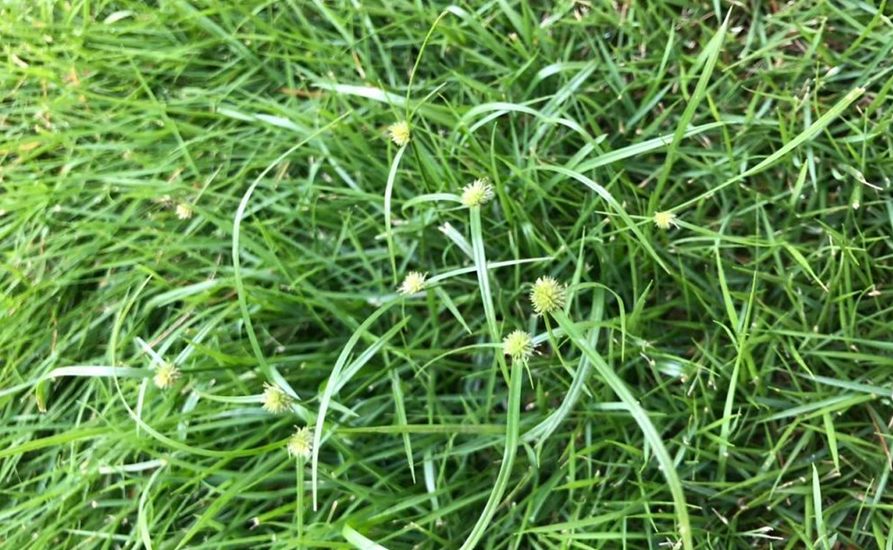
2. Nut Grass:
Nut grass, scientifically known as Cyperus rotundus, is a perennial plant with a long history of use in traditional medicine systems, particularly in Ayurveda and Traditional Chinese Medicine (TCM).
Here are some of the potential health benefits associated with nut grass:
- Digestive Health: Nut grass is believed to have carminative and digestive properties, which can help improve digestion, alleviate indigestion, and reduce symptoms like bloating and gas.
- Anti-inflammatory: Compounds found in nut grass exhibit anti-inflammatory properties, which may help reduce inflammation and alleviate symptoms of inflammatory conditions such as arthritis, rheumatism, and gastrointestinal inflammation.
- Pain Relief: Nut grass is used traditionally as an analgesic to relieve pain. It may help alleviate headaches, toothaches, menstrual cramps, and muscle or joint pain.
- Antioxidant Activity: Nut grass contains antioxidants that can help neutralize harmful free radicals in the body, thereby protecting cells from oxidative damage and reducing the risk of chronic diseases.
- Antimicrobial Properties: Nut grass has antimicrobial properties, which may help inhibit the growth of bacteria, viruses, and fungi. It is used in traditional medicine to treat various infections, including urinary tract infections, gastrointestinal infections, and skin infections.
- Diuretic Effects: Nut grass is considered to have diuretic properties, meaning it can increase urine production and promote the elimination of excess fluids and toxins from the body. This may be beneficial for conditions like edema and urinary retention.
- Menstrual Disorders: In traditional medicine, nut grass is used to regulate menstrual cycles and alleviate symptoms of menstrual disorders such as irregular periods, dysmenorrhea (painful menstruation), and menorrhagia (heavy menstrual bleeding).
- Stress Relief: Nut grass is believed to have calming and soothing effects on the nervous system. It is used in traditional medicine to reduce stress, anxiety, and nervous tension.
- Liver Health: Some traditional medicine practices suggest that nut grass can support liver health and improve liver function. It may help detoxify the liver and protect it from damage caused by toxins and oxidative stress.
- Skin Care: Nut grass is used in some cultures for its potential benefits for skin health. It may help alleviate skin conditions such as eczema, dermatitis, and acne due to its anti-inflammatory and antimicrobial properties.
Overall, It Improves digestive system, removes worms, cures infection and purifies blood. It normalizes the women’s menstrual problems and maintains normal body temperature. It is considered as the best herb for treating is considered as the best herb for treating any type of fever. The root is often used for developing high memory. Nut grass is beneficial in treating cough and asthma. The herb harmonizes liver, spleen and pancreas.
-

3.Sarsaparilla:
Sarsaparilla, a vine native to Central and South America, has been traditionally used for its potential health benefits. While scientific research on sarsaparilla is ongoing, here are some of the potential health benefits associated with it, based on traditional use and preliminary studies:
- Anti-inflammatory Properties: Sarsaparilla contains compounds like saponins and flavonoids that exhibit anti-inflammatory properties. It has been used traditionally to reduce inflammation associated with conditions like arthritis, rheumatism, and skin disorders.
- Detoxification: Sarsaparilla is believed to have detoxifying properties, assisting the body in eliminating toxins through increased urine production. It is often used to support liver and kidney health by promoting detoxification.
- Skin Health: Due to its anti-inflammatory and antioxidant properties, sarsaparilla may help improve various skin conditions, including psoriasis, eczema, and acne. It is sometimes used topically or consumed orally for its potential benefits to skin health.
- Supports Hormonal Balance: Sarsaparilla has been traditionally used to support hormonal balance, particularly in men and women. It is believed to have aphrodisiac properties and may help regulate hormone levels, although scientific evidence is limited.
- Immune Support: Some studies suggest that sarsaparilla may have immunomodulatory effects, meaning it can help regulate the immune system. It may enhance immune function and support the body's defense against infections and diseases.
- Antioxidant Activity: Sarsaparilla contains antioxidants that help neutralize harmful free radicals in the body, reducing oxidative stress and protecting cells from damage. Antioxidants are important for overall health and may help prevent chronic diseases.
- Supports Digestive Health: Sarsaparilla has been traditionally used to support digestive health. It may help soothe digestive discomfort, improve digestion, and relieve symptoms of gastrointestinal disorders like bloating, gas, and indigestion.
- Energy and Stamina: Some traditional medicine systems use sarsaparilla as a tonic to boost energy levels and enhance stamina. It may help combat fatigue and improve physical endurance, although scientific evidence is limited in this regard.
- Antimicrobial Properties: Sarsaparilla contains compounds with antimicrobial properties that may help inhibit the growth of bacteria, fungi, and other microorganisms. It may be used to support immune function and combat infections.
- Weight Management: While scientific evidence is limited, some proponents suggest that sarsaparilla may aid in weight management by promoting metabolism and supporting fat loss. However, more research is needed to confirm its effectiveness for this purpose.
-
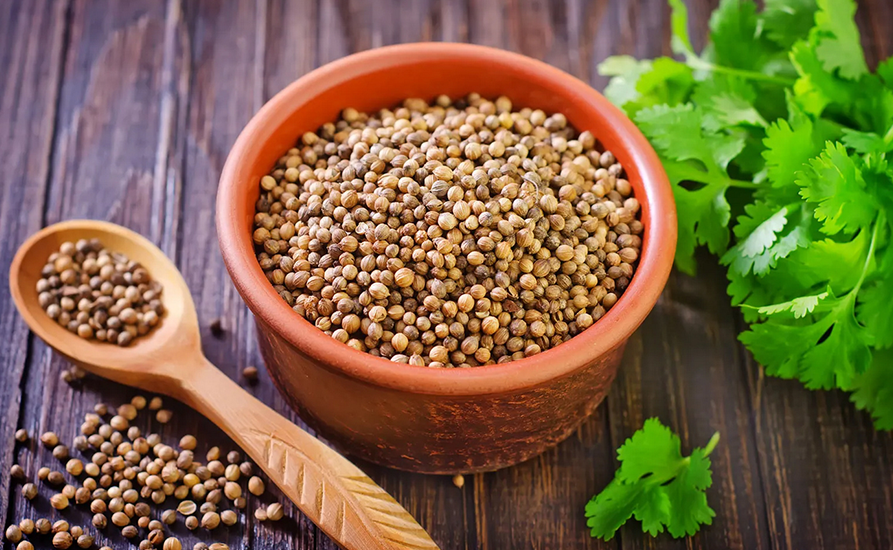
4.Coriander:
Coriander, also known as cilantro or Coriandrum sativum, is a versatile herb that is commonly used in culinary dishes around the world. In addition to its culinary uses, coriander also offers several potential health benefits:
- Rich in Nutrients: Coriander is a good source of vitamins and minerals, including vitamin C, vitamin K, vitamin A, folate, potassium, and manganese. These nutrients play essential roles in various bodily functions, including immune function, bone health, and metabolism.
- Digestive Health: Coriander is known for its carminative properties, which help relieve digestive discomfort such as bloating, gas, and indigestion. It may also stimulate appetite and promote healthy digestion by increasing the production of digestive enzymes.
- Anti-inflammatory Effects: Coriander contains certain compounds, including linalool and geranyl acetate, that exhibit anti-inflammatory properties. Consuming coriander may help reduce inflammation in the body and alleviate symptoms of inflammatory conditions such as arthritis and inflammatory bowel disease.
- Antioxidant Activity: Coriander is rich in antioxidants, including flavonoids, phenolic compounds, and vitamin C, which help neutralize free radicals and reduce oxidative stress. Regular consumption of coriander may help protect cells from damage and lower the risk of chronic diseases such as heart disease and cancer.
- Heart Health: Some studies suggest that coriander may have cardioprotective effects. It may help lower cholesterol levels, reduce blood pressure, and improve heart health by preventing the oxidation of LDL cholesterol and reducing the risk of atherosclerosis.
- Blood Sugar Regulation: Coriander may help regulate blood sugar levels and improve insulin sensitivity, making it beneficial for individuals with diabetes. Some research suggests that coriander seeds may have hypoglycemic effects and could potentially be used as an adjunctive therapy for diabetes management.
- Antimicrobial Properties: Coriander contains certain compounds that have antimicrobial properties, which may help inhibit the growth of bacteria and fungi. It may be used to prevent food spoilage and foodborne illnesses caused by pathogens such as Salmonella and E. coli.
- Detoxification: Coriander may support detoxification processes in the body by promoting the elimination of toxins and heavy metals. It may help enhance liver function and protect against liver damage caused by toxins and oxidative stress.
- Skin Health: Coriander is sometimes used in skincare products for its potential benefits to skin health. It may help soothe skin inflammation, reduce acne breakouts, and promote clear and radiant skin due to its anti-inflammatory and antioxidant properties.
- Weight Management: Some studies suggest that coriander may aid in weight loss and weight management by promoting metabolism and reducing appetite. It may help increase feelings of fullness and satiety, leading to decreased calorie intake.
It is called as 'Herb of Happiness’. Overall, incorporating coriander into diet can provide not only delicious flavor but also various health benefits. Whether consumed fresh as leaves or dried as seeds or ground spice, coriander can be a valuable addition to a healthy and balanced diet.
-

5.Cloves:
Cloves, the aromatic flower buds of the clove tree (Syzygium aromaticum), are widely used as a spice in various cuisines around the world. Beyond their culinary uses, cloves offer several potential health benefits due to their rich nutritional profile and bioactive compounds.
Here are some of the key health benefits associated with cloves:
- Rich in Antioxidants: Cloves are packed with antioxidants, including phenolic compounds such as eugenol, eugenol acetate, and flavonoids. These antioxidants help neutralize harmful free radicals, reducing oxidative stress and lowering the risk of chronic diseases like heart disease, cancer, and diabetes.
- Anti-inflammatory Properties: Eugenol, one of the primary compounds in cloves, exhibits potent anti-inflammatory properties. Consuming cloves or clove oil may help reduce inflammation in the body and alleviate symptoms of inflammatory conditions such as arthritis, gingivitis, and inflammatory bowel disease.
- Dental Health: Cloves are commonly used in oral hygiene products due to their antimicrobial properties. Clove oil and eugenol have been shown to inhibit the growth of bacteria that cause dental plaque, cavities, and gum disease. Chewing on whole cloves or using clove oil as a mouthwash may help promote oral health and freshen breath.
- Pain Relief: Cloves have analgesic properties and can help alleviate various types of pain, including toothaches, headaches, and muscle soreness. Clove oil or a clove paste applied topically to the affected area may provide temporary pain relief.
- Digestive Aid: Cloves are known for their carminative properties, which help relieve digestive discomfort such as bloating, gas, and indigestion. They stimulate the production of digestive enzymes and promote healthy digestion, making them beneficial for individuals with digestive issues.
- Respiratory Health: Cloves have been traditionally used to alleviate respiratory problems such as coughs, colds, and bronchitis. The expectorant properties of cloves may help loosen mucus and phlegm, making it easier to expel respiratory secretions.
- Blood Sugar Regulation: Some studies suggest that cloves may help regulate blood sugar levels and improve insulin sensitivity, making them beneficial for individuals with diabetes. Cloves contain compounds that may enhance glucose uptake by cells and inhibit carbohydrate-digesting enzymes, leading to better blood sugar control.
- Immune Support: Cloves possess antimicrobial properties that may help fight off infections caused by bacteria, viruses, and fungi. They stimulate the immune system and may help strengthen the body's defense mechanisms against pathogens.
- Skin Health: Clove oil is sometimes used topically to treat skin conditions such as acne, wounds, and fungal infections. Its antimicrobial and anti-inflammatory properties may help reduce inflammation, prevent infection, and promote skin healing.
- Heart Health: Cloves may have cardioprotective effects due to their antioxidant and anti-inflammatory properties. They may help lower cholesterol levels, reduce blood pressure, and prevent blood clot formation, thereby reducing the risk of heart disease and stroke.
Cloves are widely recognized all over the world for their medicinal and culinary qualities. The active principles in the clove are known to have antioxidant, antiseptic, anti-inflammatory, warming, soothing, and carminative properties. The spice contains health-benefitting essential oils such as eugenol. It helps to relieve indigestion and constipation problems. The spice also contains a good amount of minerals like potassium, manganese, iron, selenium, and magnesium. Overall, cloves are a versatile spice with numerous potential health benefits. They can be incorporated into various dishes, teas, and herbal remedies to promote health and well-being.
-
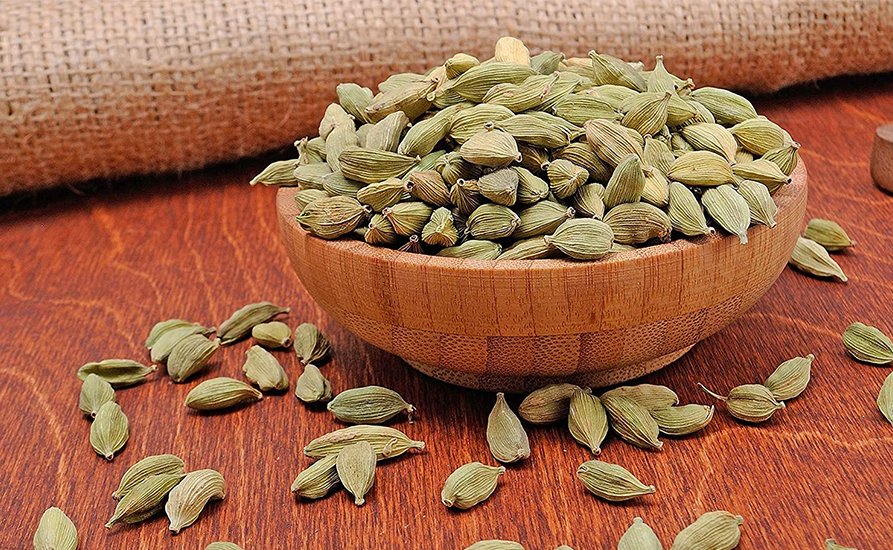
6.Cardamom:
Cardamom, a spice native to India, Nepal, and Bhutan, is well-known for its distinct flavor and aroma. Beyond its culinary uses, cardamom also offers several potential health benefits due to its rich array of bioactive compounds.
Here are some of the key health benefits associated with cardamom:
- Digestive Health: Cardamom is widely used as a digestive aid in traditional medicine systems like Ayurveda. It helps stimulate the production of digestive enzymes, promoting healthy digestion and relieving symptoms of indigestion, bloating, gas, and nausea.
- Antioxidant Properties: Cardamom contains potent antioxidants, including flavonoids and phenolic compounds. These antioxidants help neutralize harmful free radicals, reducing oxidative stress and lowering the risk of chronic diseases such as heart disease, cancer, and diabetes.
- Anti-inflammatory Effects: Certain compounds in cardamom, such as cineole and limonene, exhibit anti-inflammatory properties. Consuming cardamom may help reduce inflammation in the body and alleviate symptoms of inflammatory conditions such as arthritis and inflammatory bowel disease.
- Oral Health: Cardamom is commonly used in oral hygiene products due to its antimicrobial properties. Chewing on cardamom seeds or using cardamom oil as a mouthwash may help kill bacteria that cause bad breath, dental plaque, cavities, and gum disease.
- Respiratory Health: Cardamom has been traditionally used to relieve respiratory problems such as coughs, colds, and bronchitis. It contains expectorant properties that help loosen mucus and phlegm, making it easier to expel respiratory secretions.
- Heart Health: Cardamom may have beneficial effects on heart health. It may help lower cholesterol levels, reduce blood pressure, and prevent blood clot formation, thereby reducing the risk of heart disease and stroke.
- Blood Sugar Regulation: Some studies suggest that cardamom may help regulate blood sugar levels and improve insulin sensitivity, making it beneficial for individuals with diabetes. Cardamom contains compounds that may enhance glucose uptake by cells and inhibit carbohydrate-digesting enzymes.
- Antimicrobial Activity: Cardamom possesses antimicrobial properties that may help fight off infections caused by bacteria, viruses, and fungi. It may help boost the immune system and support the body's defense mechanisms against pathogens.
- Stress Relief: The aroma of cardamom has been associated with relaxation and stress relief. In aromatherapy, cardamom essential oil is used to promote a sense of calmness and reduce anxiety and stress.
- Weight Management: Some research suggests that cardamom may aid in weight loss and weight management. It may help boost metabolism, increase fat metabolism, and reduce appetite, leading to decreased calorie intake and potential weight loss.
In general, it is known for improving digestion and thereby appetite, relieving thirst, acidity, flatulence, and nausea. It is famed for improving circulation to the lungs, helping to subside different respiratory allergies, asthma, bronchitis, and urinary tract infections. Overall, cardamom is a versatile spice with numerous potential health benefits. It can be incorporated into various dishes, teas, and herbal remedies to promote health and well-being.
-
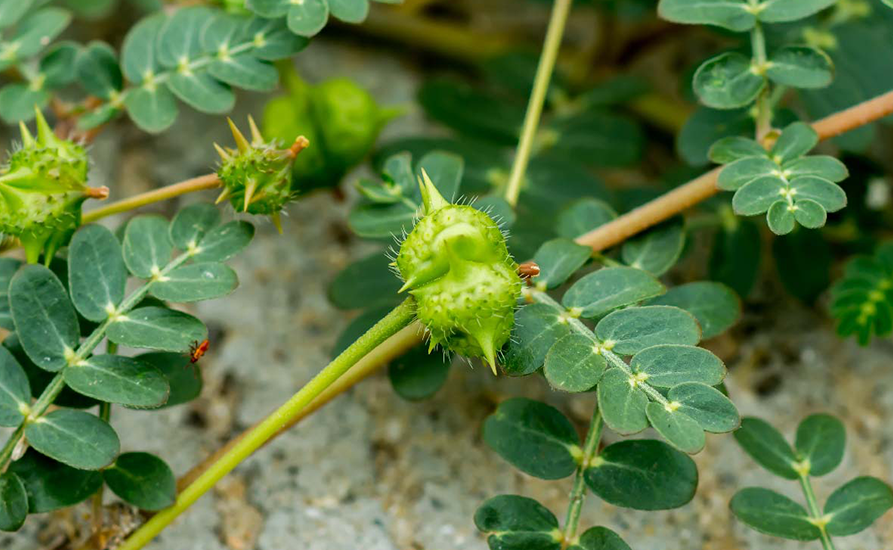
7.Neggina Mullu:
Neggina Mullu has been used for centuries in traditional medicine systems, particularly in Ayurveda and Traditional Chinese Medicine (TCM), for its various potential health benefits.
Here are some of the key health benefits associated with Neggina Mullu:
- Boosts Testosterone Levels: Neggina Mullu may help increase testosterone levels, particularly in individuals with low testosterone levels. Testosterone is an important hormone for muscle growth, strength, energy, and overall vitality.
- Improves Fertility: Some studies suggest that Neggina Mullu may improve fertility in both men and women. It may help enhance sperm quality, motility, and count in men, while in women, it may support ovulation and reproductive health.
- Athletic Performance: Neggina Mullu is sometimes used by athletes and bodybuilders to improve athletic performance and muscle strength. It may help increase muscle mass, endurance, and exercise capacity, leading to improved physical performance.
- Heart Health: Neggina Mullu has potential cardiovascular benefits. It may help lower cholesterol levels and reduce blood pressure, thereby supporting heart health and reducing the risk of heart disease.
- Anti-inflammatory Properties: Neggina Mullu contains compounds with anti-inflammatory properties, which may help reduce inflammation in the body and alleviate symptoms of inflammatory conditions such as arthritis and inflammatory bowel disease.
- Antioxidant Activity: Neggina Mullu is rich in antioxidants, including flavonoids and steroidal saponins. These antioxidants help neutralize harmful free radicals, reducing oxidative stress and lowering the risk of chronic diseases.
- Immune Support: Neggina Mullu may help strengthen the immune system and enhance the body's defense mechanisms against infections and diseases. It has been traditionally used as an immunomodulatory agent to support overall health and well-being.
- Diabetes Management: Some research suggests that Neggina Mullu may help regulate blood sugar levels and improve insulin sensitivity, making it beneficial for individuals with diabetes. It may also reduce complications associated with diabetes, such as diabetic nephropathy and neuropathy.
- Liver Health: Neggina Mullu has hepatoprotective properties, meaning it can protect the liver from damage caused by toxins and oxidative stress. It may help improve liver function and support liver health.
In general, it is useful for urinary problems, helps to detoxify the body, cleanses the urinary tract, and eases urination. Overall, Neggina Mullu is a versatile herb with numerous potential health benefits.
-

8.Pashanbheda:
Pashanbheda has been used for centuries in traditional medicine for its potential health benefits.
Here are some of the key health benefits associated with Pashanbheda:
- Kidney Stone Prevention and Treatment: Pashanbheda is most well-known for its ability to prevent and treat kidney stones. It may help dissolve existing kidney stones and prevent the formation of new ones by inhibiting the aggregation of crystals in the urine. Pashanbheda works by promoting diuresis (increased urine production), which helps flush out kidney stones and reduce their size.
- Liver Health: Pashanbheda has hepatoprotective properties, meaning it can protect the liver from damage caused by toxins and oxidative stress. It may help improve liver function and support liver health.
- Digestive Health: Pashanbheda has been traditionally used to support digestive health. It may help stimulate bile production, improve digestion, and relieve symptoms of indigestion, bloating, and gas. Pashanbheda is also used to treat gastrointestinal infections and inflammation.
- Anti-inflammatory Effects: Pashanbheda contains compounds with anti-inflammatory properties, which may help reduce inflammation in the body and alleviate symptoms of inflammatory conditions such as arthritis and inflammatory bowel disease.
- Antioxidant Activity: Pashanbheda is rich in antioxidants, including flavonoids and phenolic compounds. These antioxidants help neutralize harmful free radicals, reducing oxidative stress and lowering the risk of chronic diseases.
- Urinary Tract Infections (UTIs): Pashanbheda has antimicrobial properties that may help prevent and treat urinary tract infections (UTIs). It can inhibit the growth of bacteria in the urinary tract and promote urinary tract health.
- Gallstone Prevention: Some research suggests that Pashanbheda may help prevent the formation of gallstones by promoting bile flow and preventing cholesterol crystallization in the gallbladder.
- Anti-viral Activity: Pashanbheda has antiviral properties that may help inhibit the replication of certain viruses, including hepatitis B and hepatitis C viruses.
- Diabetes Management: Pashanbheda may help regulate blood sugar levels and improve insulin sensitivity, making it beneficial for individuals with diabetes. It may also reduce complications associated with diabetes, such as diabetic nephropathy and neuropathy.
- Respiratory Health: Pashanbheda has been traditionally used to alleviate respiratory problems such as coughs, colds, and bronchitis. It contains expectorant properties that help loosen mucus and phlegm, making it easier to expel respiratory secretions.
Overall, Pashanbheda is a versatile herb with numerous potential health benefits. It can be consumed as a tea, tincture, or capsule, and incorporated into various herbal remedies to promote health and well-being.
-
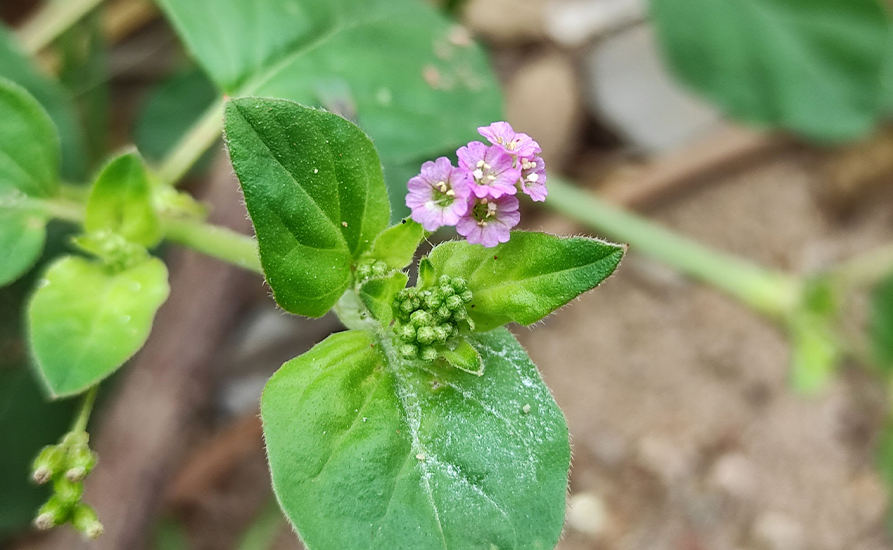
9.Punarnawa:
Punarnava, scientifically known as Boerhavia diffusa, is a medicinal herb that has been used for centuries in traditional Ayurvedic medicine. It is native to the Indian subcontinent and is known for its various health benefits.
Some of the potential benefits of Punarnava include:
- Diuretic properties: Punarnava is commonly used as a diuretic, helping to increase urine production and promote the elimination of excess water and toxins from the body. This property can be beneficial for conditions such as edema and urinary tract infections.
- Anti-inflammatory effects: Punarnava contains bioactive compounds that possess anti-inflammatory properties. It may help reduce inflammation in the body, making it potentially useful for conditions like arthritis and inflammatory bowel diseases.
- Antioxidant activity: The herb contains antioxidants that help neutralize harmful free radicals in the body, thereby protecting cells from oxidative damage. This antioxidative effect may contribute to its overall health benefits and its potential to prevent certain chronic diseases.
- Liver support: Punarnava is believed to have hepatoprotective properties, meaning it may help protect the liver from damage and support its healthy function. It is sometimes used as a natural remedy for liver disorders.
- Heart health: Some studies suggest that Punarnava may have cardio-protective effects by helping to lower blood pressure and cholesterol levels. These benefits could contribute to overall heart health and reduce the risk of cardiovascular diseases.
- Anti-microbial properties: Punarnava has demonstrated antimicrobial activity against certain bacteria and fungi, which may be helpful in treating infections, particularly those of the urinary tract.
- Anti-cancer potential: Some preliminary research suggests that Punarnava may possess anti-cancer properties, although more studies are needed to understand its potential in cancer prevention and treatment.
-

10. Cinnamon:
Cinnamon is a popular spice derived from the inner bark of several tree species from the genus Cinnamomum. It has been used for centuries in traditional medicine and cuisine across various cultures.
Cinnamon offers a range of potential health benefits, including:
- Antioxidant properties: Cinnamon is rich in antioxidants, such as polyphenols, which help protect the body from oxidative stress caused by free radicals. These antioxidants may help reduce inflammation and lower the risk of chronic diseases.
- Anti-inflammatory effects: Some studies suggest that cinnamon has anti-inflammatory properties, which may help alleviate inflammation in the body and reduce the risk of inflammatory conditions like heart disease, diabetes, and certain types of cancer.
- Improved blood sugar control: Cinnamon may help improve insulin sensitivity and lower blood sugar levels by reducing insulin resistance. This can be beneficial for people with type 2 diabetes or those at risk of developing diabetes.
- Lowering cholesterol: Several studies have shown that cinnamon may help lower LDL (bad) cholesterol and triglyceride levels while increasing HDL (good) cholesterol levels. This effect could potentially reduce the risk of heart disease.
- Antimicrobial activity: Cinnamon contains compounds with antimicrobial properties that can help inhibit the growth of bacteria, fungi, and viruses. It may help prevent infections and support overall oral health by fighting bacteria that cause bad breath and dental plaque.
- Neuroprotective effects: Some research suggests that cinnamon may have neuroprotective properties, potentially protecting brain cells from damage and reducing the risk of neurodegenerative diseases like Alzheimer's and Parkinson's disease.
- Weight management: While more research is needed, some studies have suggested that cinnamon may help support weight loss by improving metabolism, increasing satiety, and reducing appetite.
- Digestive health: Cinnamon has been traditionally used to aid digestion and relieve gastrointestinal discomfort. It may help reduce bloating, gas, and indigestion, although individual responses may vary.
-
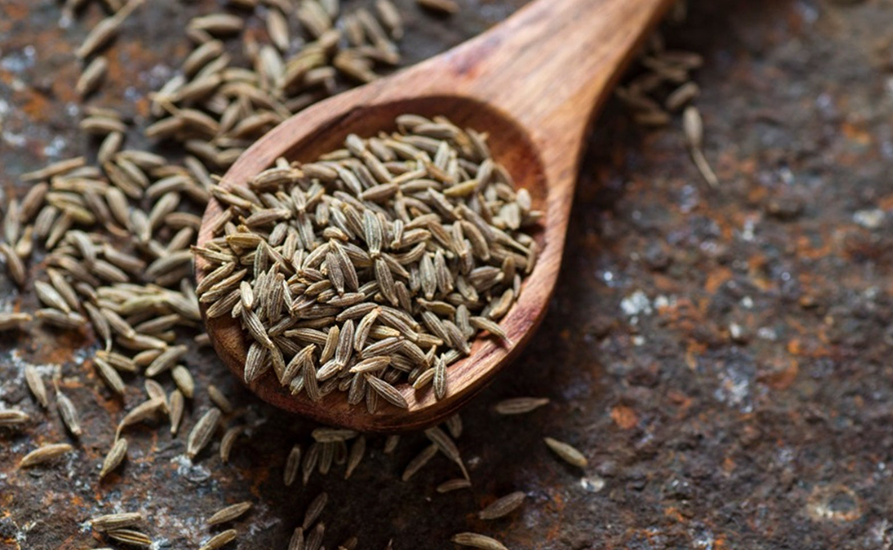
11. Jeera:
Jeera, also known as cumin, is a widely used spice in cuisines around the world, particularly in Indian, Middle Eastern, and Latin American dishes.
Apart from its culinary uses, cumin also offers several potential health benefits:- Digestive aid: Jeera contains compounds that stimulate the production of digestive enzymes, which can help improve digestion and alleviate digestive discomfort such as bloating, gas, and indigestion. It is often used as a carminative, helping to relieve flatulence and promote overall digestive health.
- Anti-inflammatory properties: Some research suggests that jeera possesses anti-inflammatory properties due to its high concentration of antioxidants, such as flavonoids and phenolic compounds. These antioxidants may help reduce inflammation in the body and lower the risk of chronic diseases associated with inflammation.
- Improved blood sugar control: Studies have shown that consuming jeera may help lower blood sugar levels and improve insulin sensitivity, making it potentially beneficial for people with diabetes or those at risk of developing the condition. However, more research is needed to fully understand its effects on blood sugar regulation.
- Weight management: Jeera has been investigated for its potential role in weight loss and management. Some studies suggest that it may help increase metabolism and promote fat loss, although further research is needed to confirm these effects.
- Antimicrobial properties: Jeera contains compounds that have antimicrobial properties, which may help inhibit the growth of harmful bacteria and fungi in the body. This can contribute to overall immune health and may help prevent infections.
- Rich in iron: Cumin is a good source of iron, an essential mineral involved in various bodily functions, including oxygen transport, energy production, and immune function. Incorporating jeera into your diet can help prevent iron deficiency anemia, particularly in individuals who have increased iron needs, such as pregnant women and menstruating individuals.
- Anti-cancer potential: Some preliminary studies suggest that jeera may have anti-cancer properties, including the ability to inhibit the growth of cancer cells and induce apoptosis (cell death) in cancerous cells. However, more research is needed to understand its role in cancer prevention and treatment fully.
- Heart health: Jeera may help promote heart health by reducing cholesterol levels and improving lipid profiles. It may also help lower blood pressure and reduce the risk of cardiovascular diseases when consumed as part of a balanced diet.
